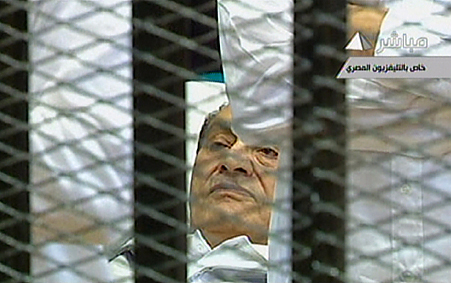
Former Egyptian president Hosni Mubarak lies on a stretcher as he listens to the opening proceedings in the court room in the police academy on the outskirt of the capital Cairo, August 3, 2011. (Photo: AFP / Getty Images)
Only a madman would have predicted, even nine months ago, that Egyptian TV’s ramadan special, this year, would be the trial of Hosni Mubarak. It’s a compelling spectacle, to be sure, the erstwhile epitome of the Arab “strongman” now laid low on his sickbed inside a courtroom cage, forced to answer for the violence unleashed by his regime on peaceful protestors last winter, and for the years of corruption and abuse that preceded it. If Egypt’s revolution were a Hollywood movie, this might be a fitting moment to fade to black and roll the credits. But Egypt’s revolution is not a movie — nor even a completed revolution, as yet. And despite the symbolic power in the image of a once-unassailable dictator being clapped irons to face justice, Mubarak’s ritual humiliation doesn’t necessarily reflect the end of the regime atop which he sat.
On the contrary, as things stand, Mubarak may simply be — albeit unwillingly — taking one for the team.
Mubarak did not create his regime; the regime, based in Egypt’s armed forces since they overthrew the monarchy in 1952, created Mubarak, choosing the former Air Force chief to lead it in the crisis that followed the assassination of President Anwar Sadat in 1981. Over his 30 years in power, he sought to remake that regime in his image, and during his twilight years in power had sought, even, to position his own son (and co-accused) Gamal Mubarak as his successor — a proposition that never sat well with an officer corps accustomed to seeing one of their own in power. After all, dynastic succession had been the way of the monarchy overthrown by the Free Officers Movement that created the regime; it had been the military’s own meritocratic culture that had allowed Mubarak to rise to the presidency despite his humble birth.
(PHOTOS: Scenes from the Mubarak Trial)
And when the excesses and abuses of the regime finally provoked a revolt of the masses last winter, the military spine of the regime recognized that stability could not be restored as long as Mubarak remained in power — so, the generals forced him out. But they did not yield power to the risen masses; instead, they claimed it for themselves, as a collective — the Supreme Council of the Armed Forces, a not-entirely-transparent junta composed of between 20 and 28 officers from the top echelon of the military. Initially, they simply shipped Mubarak off to his summer residence in Sharm el-Sheikh, hoping to allow him a dignified retirement. But the clamor on the streets continued for the erstwhile “Pharaoh” to be brought to justice and for the defanging the security services that had been the regime’s political bludgeon.
Putting Mubarak on trial is the junta’s response, heeding a popular demand, but without necessarily changing the power equation. The trial coincided with the clearing of Tahrir Square of the last remnants of the protest movement last Saturday, the Supreme Council determined to restore order and put an end to disruptive mass action as it oversees a transition on its own terms. There have been plenty of indications that the generals may seek to retain some authority over the elected government in any new order. Whether they’ll achieve that goal may depend on the extent to which Egyptians are prepared to allow it, and the leverage they can muster to prevent it.
Many lizards have defense mechanism known as “autotomy”, shedding their tails in moments of mortal peril, creating a skittering and twitching decoy to distract an attacker. If the predator is fooled, the lizard escapes, and grows a new tail.
While Mubarak has been shed, the regime remains intact — and in charge. His trial could be the dawning of a new era of accountability that forever changes Egyptian politics by empowering its citizens to take their destiny into their own hands and subordinate their armed forces to the civilian government they elect. It could, however, also turn out to have been a spectacle of symbolic retribution that does little to alter the fact that it is the generals that hold power, even if they claim to do so in the name of “the revolution”.
Either way, that’s question that will be answered outside the courtroom.

